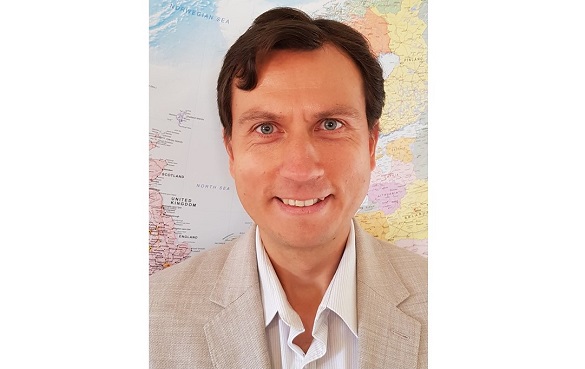
Dr Vitaliy Kurlin, a Senior Lecturer in the University’s Materials Innovation Factory (MIF) and Department of Computer Science, has been awarded a prestigious Royal Academy of Engineering Industrial Fellowship for 2021-2023.
Dr Kurlin works at the interface of data science and materials science. His research focus is in the new area of periodic geometry and topology to enable inverse design of solid crystalline materials by explicitly parameterising the space of all known and not yet discovered crystals. He also leads the Data Science Theory and Applications group in the MIF with a number of PhD students based in several departments across the university from Computer Science to Chemistry and Molecular Biology.
Entitled `Data Science for Next Generation Engineering of Solid Crystalline Materials’, the specific focus of Dr Kurlin’s fellowship will be an industry-scale application of the recently developed continuous classification of all periodic crystals up to rigid motion, the strongest equivalence relation preserving solid crystalline structures. This classification will continuously quantify similarities between periodic crystals that were impossible to compare in the past because of differences in their chemical composition or symmetry.
This award builds on the earlier results achieved through the £3.5M EPSRC grant “Application-driven Topological Data Analysis” led by Dr Kurlin jointly with the Universities of Oxford and Swansea. Both research projects unify tools from pure mathematics, computational geometry and nearest neighbour search algorithms to tackle the key challenges in materials science that remained unresolved for dozens of years.
Dr Kurlin said: “I am grateful to colleagues at the University and the Cambridge Crystallographic Data Centre, who have recognised the necessity and importance to study all periodic crystals within a common continuous space without cutting it into pieces by symmetries or chemical compositions. An explicitly parameterised map of this huge space will reveal unexplored areas that can contain extraordinary materials, which are unrealistic to discover by trial-and-error or blind sampling even on the most powerful supercomputers.”
Professor Wiebe Van Der Hoek, EPVC for the University’s Faculty of Science and Engineering, said: “This fellowship demonstrates the success of our inter-disciplinary approach to research by bringing together all schools from the Faculty: Data Science advances in EEECS, crystallographic applications in Physical Sciences, inverse design for engineering new materials in the School of Engineering, and even the School of Environmental Sciences, because Vitaliy’s joint work with the groups of Professor Andy Cooper and Professor Matt Rosseinsky in the MIF aims for more efficient materials to address climate change.”
The Fellowship will allow Dr Kurlin to devote himself to the collaboration with the Cambridge Crystallographic Data Centre (CCDC), which has hired a two-year postdoctoral assistant to build a structure-property map of the world’s largest Cambridge Structural Database containing more than a million existing crystals.
Dr Jason Cole, Senior Research Fellow at CCDC added: “The strong relationship between Liverpool and CCDC has allowed us to develop, via shared PhD students, new and innovative ways of analysing and comparing crystal structures that should be highly beneficial, initially in the CCDC Crystal Structure Prediction Blind Test, but subsequently to industrial parties interested in crystal structure landscapes. We are expanding the collaboration via a shared postdoctoral assistant. This will enable more innovation, taking advantage of the unique strengths each institute brings.”
The Royal Academy of Engineering Industrial Fellowship scheme, which covers all Engineering subjects and closely related areas including Materials, Computing and Data Science, provides experienced academic researchers with the opportunity to focus on full-time research for up to two years, by relieving them of all their teaching and administrative duties during that period.